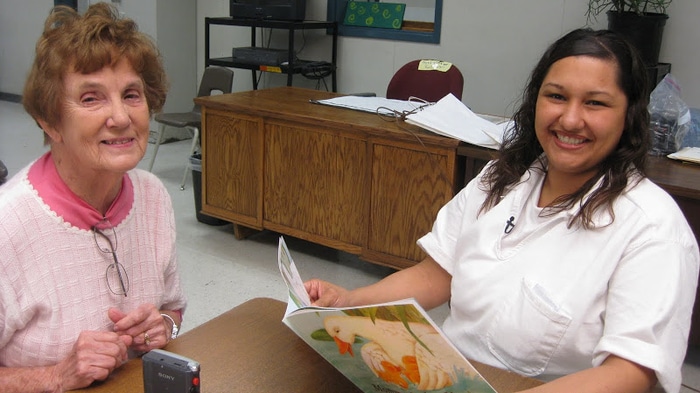
Women’s Storybook Project volunteer with a mother who is ready to create a recording
With the help of 200 volunteers and thousands of books, Women’s Storybook Project of Texas connects incarcerated mothers with their children through reading.
Donated books are given to mothers to read aloud. Volunteers record their voices and then deliver the book and tape to the children. This helps bond families dealing with incarceration, and promotes an interest in books and using the imagination.
Though this process may seem straightforward, the reality is far more complicated. I met with the President of Women’s Storybook Project of Texas, Judith Dullnig, to gain insight into how she has grown this generous organization over the past 11 years.
Women’s Storybook Project Process
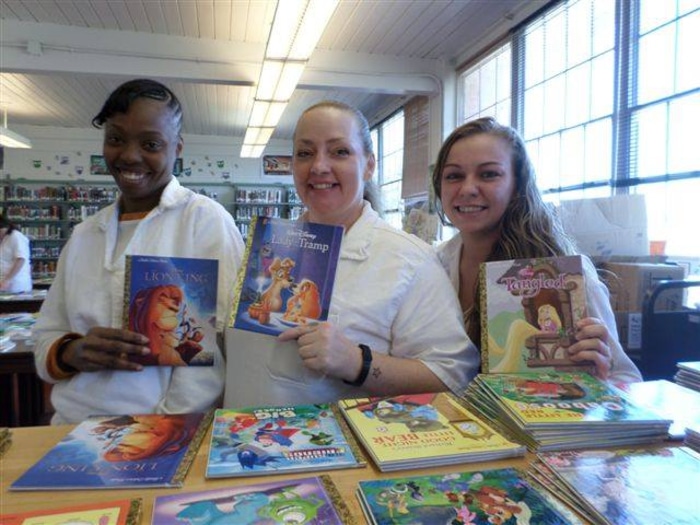
These moms are choosing a book for their children to receive
The idea for the process came from Chicago’s Lutheran Social Services, but Dullnig did not want Women’s Storybook Project of Texas to be religiously affiliated, so that everyone would feel welcome to take part.
Dullnig began with four tape recorders in one prison unit. She worked alongside a social worker to resolve the difficulties of working within a prison.
The program either works directly with the prison or through Windham School District, a school within the prison system. Through the prison or school, mothers earn the opportunity to take part in the program by demonstrating good behavior for 90 days. Once participants are selected, volunteers caravan to the prison on a Saturday. Moms and volunteers sit together to briefly talk about their kids, and then they choose a book to read. Women’s Storybook Project of Texas only uses new books that often come from Barnes & Noble or BookPeople in Austin.
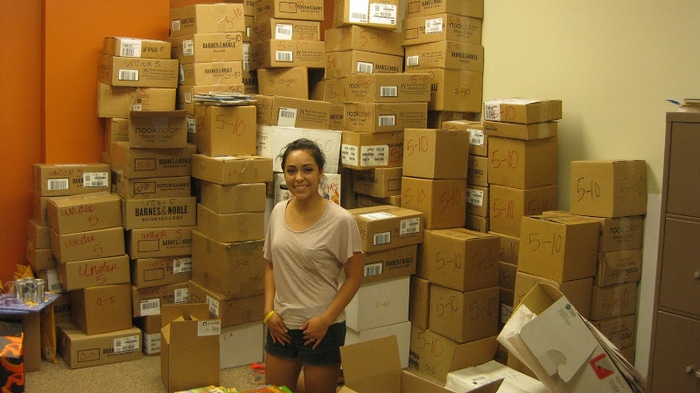
Boxes and boxes of books!
Books are set out on tables, sorted by age group, and volunteers help moms pick the perfect one. “The Invisible String” by Patrice Karst, “Goodnight Moon” by Margaret Wise Brown, “Diary of a Wimpy Kid” by Jeff Kinney, the “Percy Jackson & the Olympians” series by Rick Riordan and, of course, any Dr. Seuss book are currently popular choices.
Women with children ages 12 and under can participate, and they can make a recording for each of their children. They begin each tape with a personal message. Many of the mothers get nervous and tearful at this point, but volunteers remind them it’s okay to cry and show emotion, since it’s such a difficult situation for the whole family.
After reading either the entirety of a short book or part of a chapter book, moms share a closing message. This is often “I love you” and other sentiments as simple as “be sure to brush your teeth,” that they don’t get to say on a daily basis.
The Monday after each recording session, the packages of books and tapes are sent to the children. Mothers are able to record a book once a month for four months, but they can reapply to be in the program again if space and time allow.
Positive Results from Reading
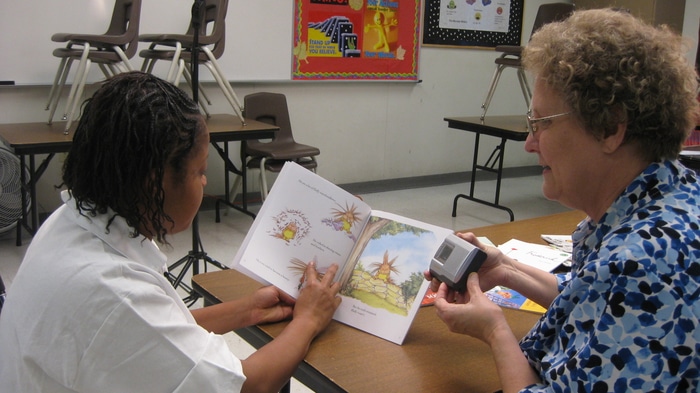
Women’s Storybook Project recording in progress
Since Women’s Storybook Project of Texas has been running in Texas prisons, behavior and self-esteem have improved. One prison warden stated that just seeing volunteers come in, treating each other and the inmates with respect, makes a difference to those who feel dehumanized.
A lot of love goes into the program, and the participants are very appreciative. As Dullnig told me insightfully, “Mistakes don’t mean they love their child any less.”
While visiting the organization’s office, I read a letter from the caregiver of a child who recently received her book and recording package. The caregiver said the program had lifted the child’s spirits, and now she wanted to become a volunteer.
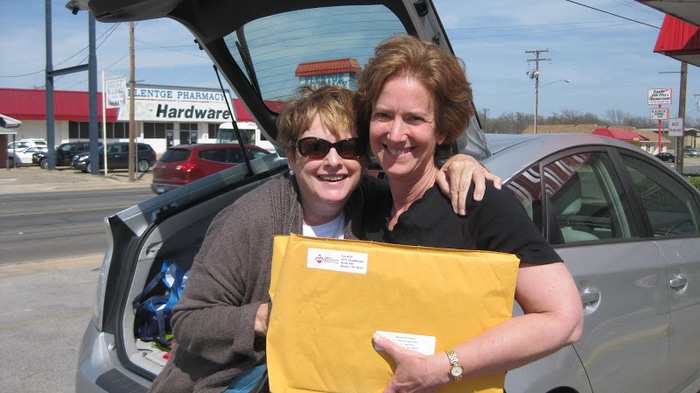
Holding a very important package (Judith Dullnig is on the left)
Currently, Women’s Storybook Project of Texas runs six units, sending out about 350 books a month. Three more units are starting up soon.
Dullnig is often asked how to start similar organizations across the country, and she’s happy to see the idea spreading. She also wants to start reaching out to moms once they’re out of prison, to continue the gift of reading.
How to Get Involved
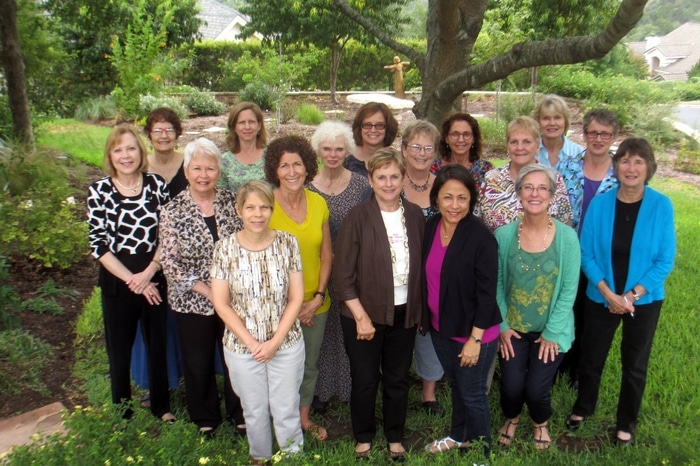
Women’s Storybook Project volunteers
Women’s Storybook Project is in need of funding, as transportation is a large expense on its own. Please visit the website for more information on donating money or time.
Follow Women’s Storybook Project on Facebook and Twitter for updates, and watch these two informative and moving videos to learn more about the program and its effects.
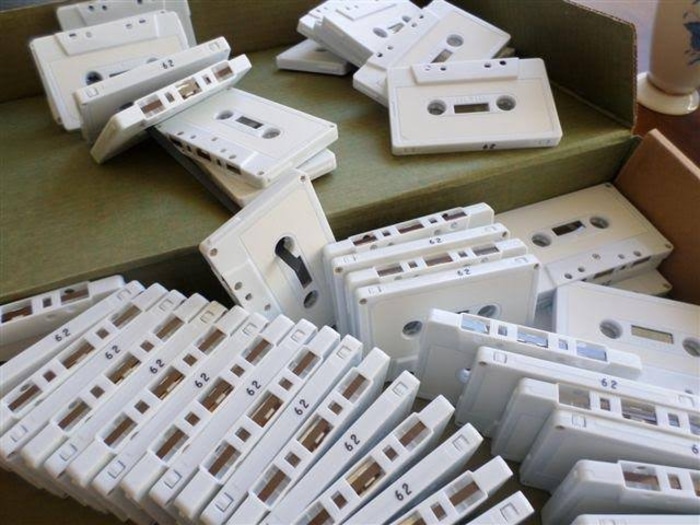
Tapes and CDs have been used throughout the years, but Dullnig says they’re getting approval to bring in computers to record digitally
@MadameKLM wants to know:
Which book would you donate for Women’s Storybook Project?
- Guide to Bat Season in Austin - July 20, 2020
- Reimagining Life With Rachel Ahern of Weird City Taxidermy - March 28, 2017
- SXSW Red Carpet Musings With Todrick Hall, Nick Offerman - March 22, 2017

Leave a Reply
You must be logged in to post a comment.